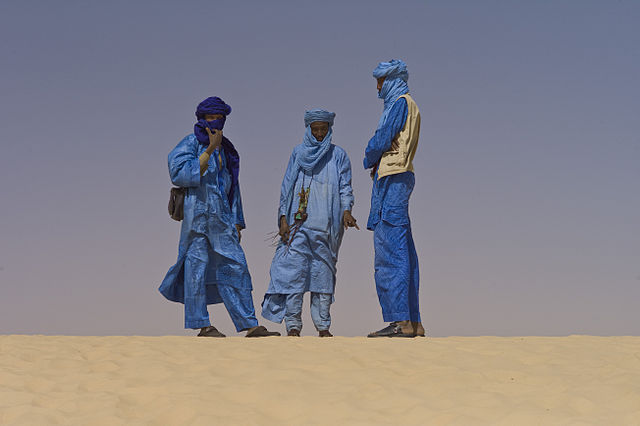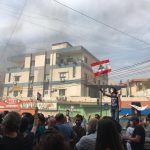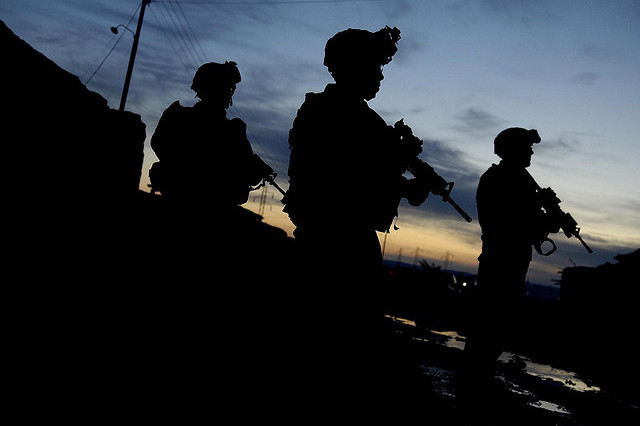The crisis affecting Mali and southern Algeria is only the latest phase in a long pattern of conflict. The often nomadic Saharan Tuareg, with populations spreading far beyond northern Mali, have never had a stable relationship with the more settled populations to the south. They have been in rebellion or on the verge of it for much of the last 22 years, and Libya as well as Algeria have played disruptive supporting roles in the course of that troubled period.
The latest blow-up in the southern Sahara cannot be viewed in isolation, especially as various outside parties cast about for ways of resolving it. Mali, neighboring Niger, or both have been wracked by a series of rebellions, largely Tuareg (1990-1995, 2007-2009), and a mix of Tuareg and Islamic extremists in 2012-2013. Tuareg grievances have ranged from greater freedom from central governments based along the Niger River to the south, to, increasingly in Mali, demands for outright autonomy or independence. Beginning nearly a decade ago, they have been taking on more of a militant Islamic character (once again, mainly in Mali).
Muammar Qadhafi was involved as an enabler in the first rebellion in Niger in the 1990’s, providing weapons, training and safe haven for Tuareg rebels fighting and raiding in Niger. In 2009 he played a role in ending the second rebellion, but the rebels again enjoyed access to Libya. The current rebellion was enhanced greatly by the massive infusion of Libyan arms brought down from a fractured Libya by Tuaregs and other militants present there as a result of the previous episodes (with some southerners even used by Qadhafi as combatants in his vain, bloody effort to stave off defeat).
Lately, the focus has been on Algeria because of the 4-day ordeal at the Ain Amenas natural gas complex in the Algerian southeast. Much media coverage has been sympathetic to Algeria’s long struggle against Islamist “terrorism.” The facts cast Algeria in a somewhat darker light.
The authoritarian, dysfunctional, notoriously corrupt, and military-heavy elite in Algeria panicked after the Islamic Salvation Front (or FIS, based on its French title) won the first round of Algeria’s only truly fair national assembly elections in 1991. The military cancelled the second round in January 1992, replacing a President and possible progress toward greater democracy with a military junta and a brutal crackdown. The Islamists, most previously relatively moderate, took up arms against this ruthless cabal (with support from many ordinary, downtrodden and neglected Algerians more generally).
Algeria was destabilized amidst what became a virtual civil war through 1997, taking the lives of up to 200,000 people. Ironically, in crushing the uprising, the Algerian military used many of the same ruthless tactics employed by the French during their war to suppress Algerian independence. Later in the conflict, quite a few embittered Islamist fighters turned to extremism, with one offshoot eventually forming the militant Salafist Group for Call and Combat (or GSPC from its French name). Splinter elements of the GSPC took refuge from Algerian forces in the north of an impoverished Mali over a decade ago.
Long shunned by much of the international community for its various abuses in the 1990’s, Algeria, led by authoritarian President Abdelaziz Bouteflika (reelected with purportedly over 90% of the vote in 2009), broke out of its isolation after 9/11. A Bush Administration eager to rope in any assistance curbed the US’ policy of wariness toward the Algerian regime, viewing the latter’s long battle with Islamist “terrorism” as a valuable resource, despite its dismal track record otherwise.
Fragments of the GSPC later morphed into al-Qaeda in the Islamic Maghreb (AQIM), also setting up shop across the border in Mali. Although the GSPC engaged in kidnappings, drug trafficking, killings and even occasional terrorism back in Algeria, Algerian security forces did relatively little to cooperate actively with countermeasures aimed against the GSPC and AQIM beyond their own borders (despite the near absence of Malian central governance in its Saharan north). While still serving with the US Intelligence Community during an operation against a dangerous GSPC cell in northern Mali some years ago (when Mali had asked for American and Algerian assistance), the Algerians remained largely passive.
For decades there also has been a desperate need for political change in an Algeria where far too little of its growing oil and gas revenues reach the bulk of the population. Yet, the “Arab Spring” fizzled there. Even though demonstrations (including self-immolations) occurred in many locales causing President Bouteflika to terminate (at least formally) a 19-year state of emergency and promise reform, little has changed. Many Algerians remain cowed by the sheer scale of brutality during the grueling internal warfare of the 1990’s.
Many aspects of the hostage crisis at Ain Amenas bear the hallmarks of the chequered performance of Algeria’s government and security forces. First off, after agreeing to allow France over-flights and to provide some intelligence related to the French blitzkrieg against the extremists in northern Mali, Algiers should have been bracing for potential trouble days before the French struck. Instead, Algerian security was caught off guard (despite their familiarity with this highly mobile foe and a nearby Algerian Army base). Next, Algiers resisted meaningful international cooperation and instead launched its own initially clumsy rescue attempt during which Algerian helicopters reportedly blasted trucks containing hostages (hence the grumbling in some foreign capitals).
Stepping back a bit, a major factor to bear in mind as this crisis evolves more broadly is whether the problem will remain primarily confined to Mali — especially if and when French, Malian, and African forces press deeper into northern Mali. Borders mean precious little in this trackless area to either AQIM or the Tuareg. This mess could easily spill over into the adjacent and equally ill-governed deserts of Niger or Mauritania.
Photo: Tuaregs at the January 2012 Festival au Désert in Timbuktu, just before the MNLA launched the Azawadi rebellion later that month. By Alfred Weidinger (Wikimedia Commons).





